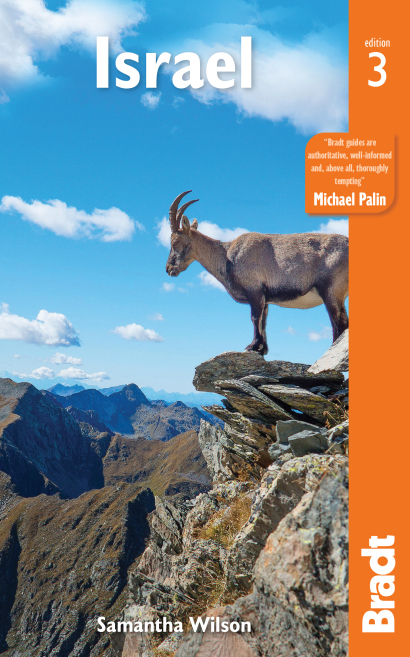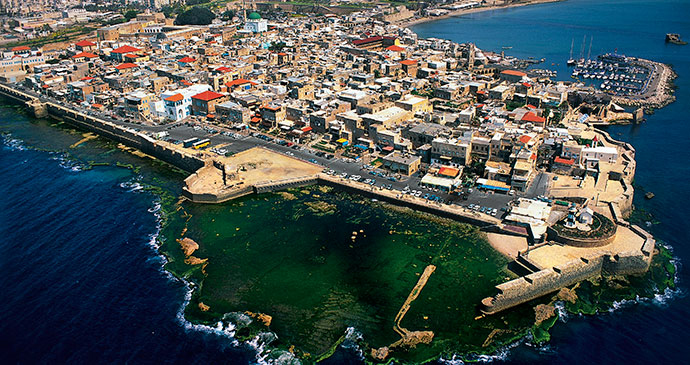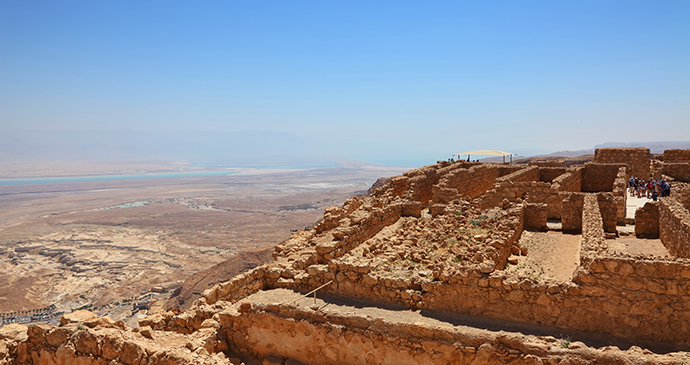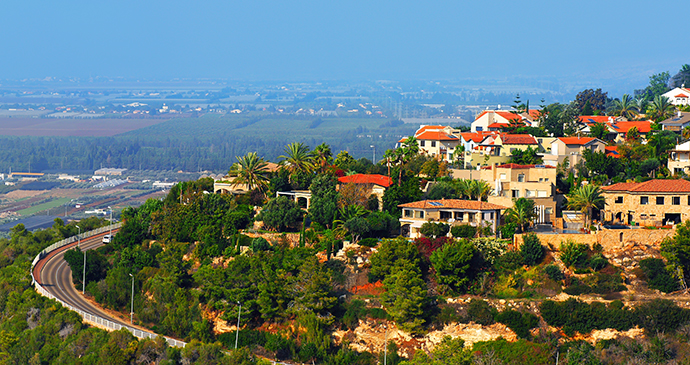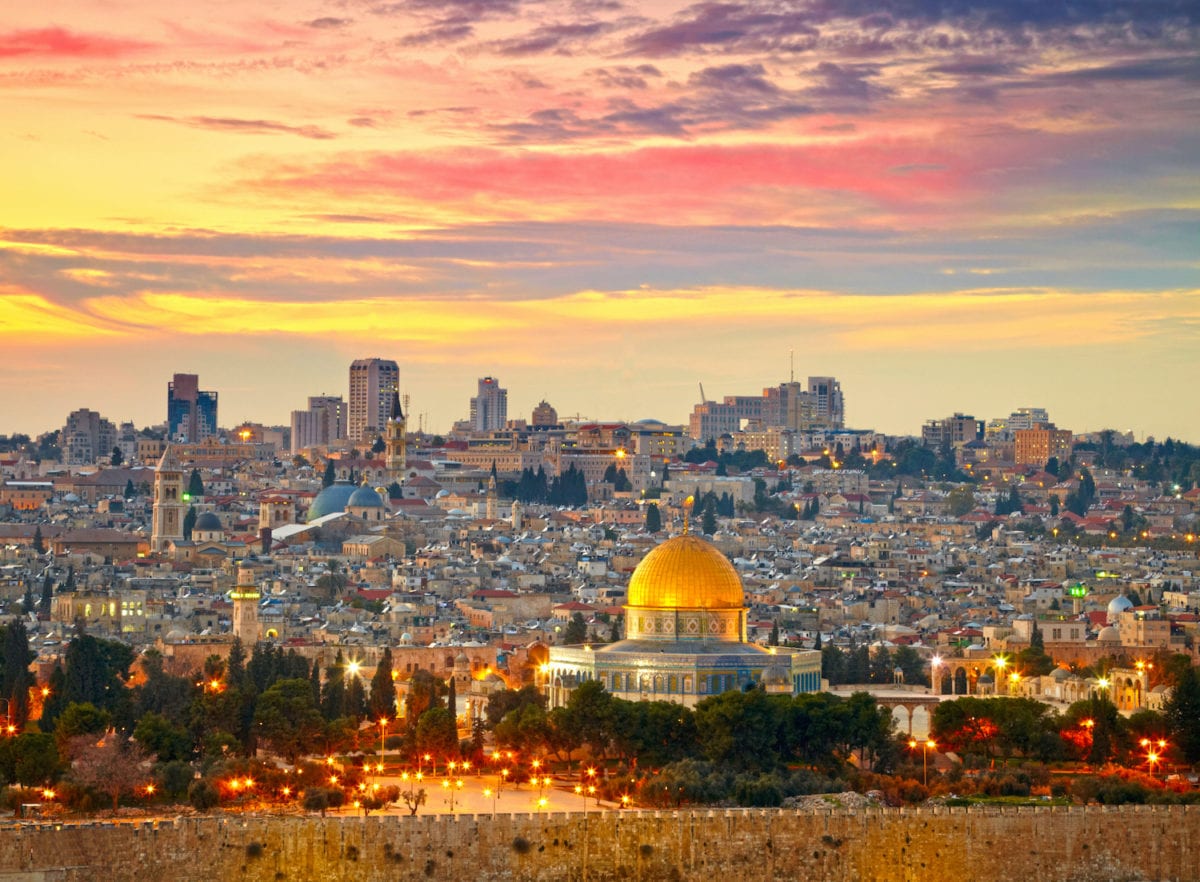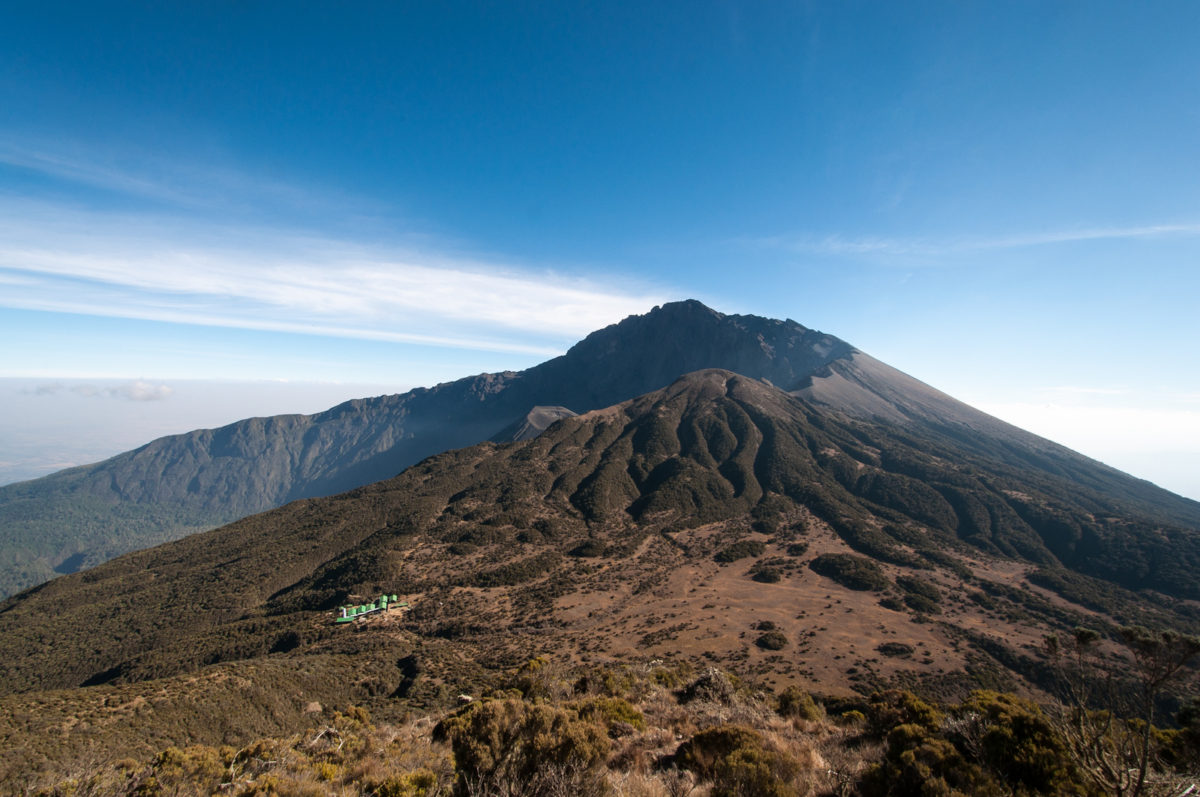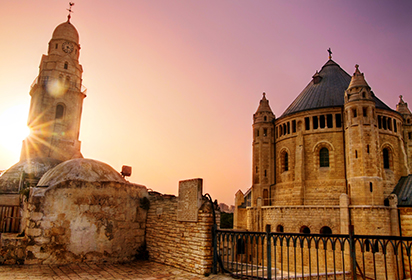Israel is a land of dramatic and poignant contrasts, a land whose tumultuous existence often casts a shadow over the rich and vibrant life that beats beneath it.
Samantha Wilson, author of Israel: The Bradt Travel Guide
Put simply, Israel is a fascinating travel destination. Whether you‘re looking for a city break or longer holiday, the country boasts a wealth of tourist appeal with its stunning landscapes, pristine Mediterranean, Red and Galilean sea coastlines and some of the world’s most important religious and historic sites.
Tel Aviv is undoubtedly the cosmopolitan heartbeat of the country where you can relax on stunning beaches by day, dine in style and then party all night. In contrast, Jerusalem is the place to delve into the spiritual origins of Judaism, Christianity and Islam at sacred sites that leave even the most religiously apathetic of visitors in awe.
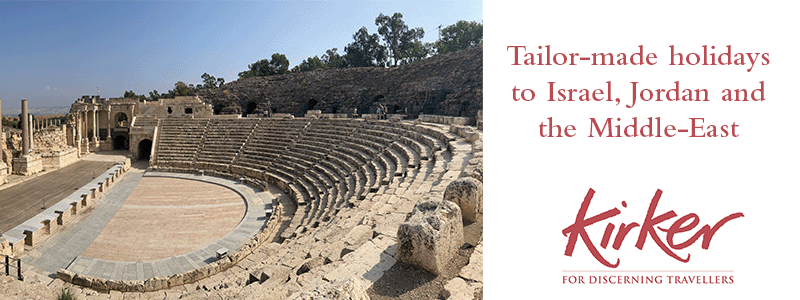
Wander through the cobblestone alleys of the Old City’s enchanting mix of quarters and let yourself be taken away by the Arab friendliness and hubbub of daily life at one of the greatest cultural crossroads on earth.
If the opportunity arises, take your time to hike along the Israel National Trail, swirling from the touristy, but not unappealing, glitzy resort of Eilat, via the spectacular Negev Desert all the way to the northern border with Lebanon.
And no trip to Israel is complete without a day or two in Haifa, the most characteristic and culturally diverse city in the country, or a trip to the surreal saline waters of the Dead Sea.
Israel is on our list of 2023 Exceptional Trips! Read the full list here.
For more information, check out our guide to Israel
Food and drink in Israel
Food
With such a diverse population, there is not really such a thing as ‘Israeli food’. Culinary styles have blended together from all across the world to leave a rather eclectic mix of cuisines. Apart from the insuppressibly popular Middle Eastern fast foods such as hummus and falafel, both kosher and non-kosher restaurants are well and equally represented. Tel Aviv is undoubtedly the culinary centre of the country, and is home to the bulk of non-kosher restaurants. While Jerusalem may be considered a little more conservative than experimental, secular Tel Aviv, it has a wonderful mixture of cuisines, including some creative vegetarian places. Haifa too has benefited from its varied population and offers a wealth of great eateries. For rustic country food, juicy, succulent steaks and age-old, traditional Druze dishes the wilds of the Golan Heights, with its cattle ranches, farming communities and sweeping lands, is the best bet, while Eilat offers the complete opposite with themed restaurants and beach bars.
Drinks
Israelis love their coffee, so you will find cafés in the most unlikely of places. Be sure to try the strong, aromatic Arabic coffee that is hugely popular in Israel. A word of warning, however: avoid drinking the entire contents of the cup as a thick layer of coffee sediment sits at the bottom, which is rather unpleasant to swallow.
While Israelis aren’t particularly big drinkers, they love the whole bar scene and most alcohols are represented. The local beers are Goldstar and the better known, but less popular Maccabee; both are more or less respectable, but they pale in comparison to a very good, albeit a little commercialised, Jem’s or other more low-key brews of the booming craft beer industry. Beer enthusiasts will feel particularly at home in Tel Aviv, where some bars specialising in local beer have an endless variety on offer. Israel is furthermore a proud producer of excellent quality wines, regularly winning prizes at international fairs.
Health and safety in Israel
Health
Israel is a modern, developed country with Western standards of health, hygiene and medical facilities. Visitors do not need to have any vaccinations to enter the country although it is advisable to be up to date on tetanus, polio, rubella, mumps and diphtheria. Hepatitis A is usually recommended as there is a moderate risk of disease. It is also advisable to get children vaccinated against measles as outbreaks have occurred primarily in Orthodox neighbourhoods of Jerusalem where vaccination is opted against. Israel is home to several highly reputable and internationally renowned hospitals. Pharmacies are commonplace, well stocked with most Western-brand medicines and have pharmacists who speak a high level of English.
Travel clinics and health information
A full list of current travel clinic websites worldwide is available on www.istm.org. For other journey preparation information, consult www.nathnac.org (UK) or http://wwwnc.cdc.gov/travel/ (US). Information about various medications may be found on www.netdoctor.co.uk/travel. All advice found online should be used in conjunction with expert advice received prior to or during travel.
Safety
In general, visitors to Israel encounter few problems. Crime levels are low and while petty theft and pickpocketing do occur, violent crimes are rare. The most worrying safety threat for people considering a trip to Israel is terrorism, which despite considerable improvements over recent years, is unfortunately a part of life in the country. As the security situation in Israel and the Palestinian Territories can change rapidly, it is important to check with your country’s foreign office before setting off.
Terrorism
Compared with many countries, Israel has a higher risk of terrorism, although stringent security measures have resulted in fewer bombings. Despite a decrease in indiscriminate suicide bombings, it is important to understand the danger and simply be aware. Bombers target crowded areas such as transport terminals, shopping centres, restaurants, markets and nightclubs. It is important to be vigilant and stay away from establishments that do not have security guards outside – it is common to be checked with a metal detector and be asked to open bags before entering most places. As situations can change quickly, it is a good idea to monitor media outlets and always follow the instructions of Israeli authorities. It is recommended to register at your country’s consulate upon arrival, especially if staying in Israel for a long time, as they will be able to inform you of any changes to security issues.
Driving
Statistically you are considerably more likely to come to harm driving down Israel’s motorways than in a terrorist attack, and it is important to be aware of the somewhat haphazard driving techniques many Israelis have adopted. The idea that road traffic rules only apply to others, combined with aggressive driving techniques and high speeds, sadly results in hundreds of deaths a year. Tiredness on the long, straight, monotonous roads in the desert can also lead to accidents, so pull over and rest if you feel yourself start to tire.
Female travellers
As in any country, women travelling alone can incur unwanted attention and face additional security risks. On the whole, Israel is safe for women and violent crimes are rare, but sensible precautions should be taken to ensure you have a hassle-free trip. In particular at Ben-Gurion Airport, solo female travellers can incur unwanted attention and face additional security risks. Wearing a wedding ring, dressing modestly, exercising caution if hitchhiking, staying in well-lit areas at night, letting someone know where you are going, carrying cash on you for a taxi or phone call, staying in women-only dormitories and ignoring male advances can all help avoid unwanted confrontations.
LGBTQ+ travellers
In recent years, Tel Aviv has well and truly established itself on the gay travel scene, and its residents and tourism board are fully embracing and encouraging this trend. The annual Gay Pride parade attracts party-goers from around the country and the world, and there is a burgeoning nightlife scene aimed at homosexual revellers. The city is liberal and secular, and as such it is common to see open displays of affection.
In complete contrast is Jerusalem, whose predominantly religion-abiding residents are less used to, and therefore less tolerant of, homosexuality. While in the modern city it is sometimes fine to be openly affectionate, in religious neighbourhoods, the Old City or near any religious buildings this will not be well received, and violence has been reported in the past. The rest of the country can be divided into either the Tel Aviv or Jerusalem category, with cities such as Haifa, Eilat and predominantly secular cities generally more respectful of homosexuality, with religious neighbourhoods and cities such as Safed, Nazareth and Acre strongly opposed.
Travelling with a disability
Israel is a modern country and as such it is well geared towards travellers with disabilities. Increasing numbers of establishments, national parks and public transport have disabled facilities, wheelchair accessibility and assistance, and the Israeli government is working on schemes and projects to increase this number.
Travel and visas in Israel
Visas
Citizens from certain countries will be issued with a tourist visa at their port of entry, valid for up to three months (a passport valid for six months from the date of entry will need to be provided). Citizens of all other countries should contact their local Israeli consulate or Israel’s Ministry of the Interior.
Israel does not hold diplomatic relations with most Arab and predominantly Muslim countries, so Israeli citizens are not permitted to travel to such places. Moreover, foreign nationals who have an Israeli visa stamp inside their passports will be refused or find it difficult to travel to many of these countries. This is, however, less of a problem now than a few years back. Currently, on arrival to Israel visitors are issued with a slip of paper with a bar code valid for three months. This effectively replaces the visa and needs to be kept in the passport, as it is often asked for in hotels and will be required for your tax refund and eventual departure from Israel. Other than that, there will be nothing left in the passport to suggest you have visited Israel.
Getting there and away
By air
Ben-Gurion International Airport (TLV) is Israel’s main international airport, although more and more charter flights now go to Ovda Airport near Eilat; and Tel Aviv revealed a plush, new terminal in 2004.
By land
Of its neighbours Israel only has diplomatic relations with Jordan and Egypt and therefore it is only possible to travel overland (or by any other means for that matter) between these countries.
By sea
Ferry lines have been closed due to lack of traffic for several years, but it is still possible to get on one of the increasingly popular cruises departing from Haifa’s port.
Getting around
Israel is wonderfully compact, making travel easy, affordable and free of draining, long-distance journeys. It is in fact possible to drive from Israel’s northernmost point in the Golan Heights to the southernmost tip of Eilat on the Red Sea in about 8 hours. While public transport is good in most urban regions, travelling around areas such as the Golan Heights and Negev and Arava deserts can be arduous and time-consuming without your own wheels, so renting a car is highly recommended to get the most out of your time in these beautiful, wild and remote regions. It is important to note that, with the exception of some services in Haifa, none of Israel’s public transport runs on Shabbat or religious holidays.
By bus
Buses are the most commonly used form of public transport in Israel, and both inter- and intra-city networks are very developed. Conditions are good, and although inter-city buses can get crowded, all are air conditioned, clean and comfortable (in particular long-distance coaches, for which seats need to be reserved). Tickets can be purchased either at ticket booths inside bus stations or from the driver. Discounts for students and senior citizens are available. Remember that Israeli bus drivers strictly observe bus stops and will not pick up or drop off passengers on request anywhere other than the designated stop.
By train
Although bus travel still forms the core of public transport, Israel’s train network is growing extremely quickly and, with massive rush-hour congestion problems around all main cities, it is becoming a very popular commuter option. Train services are particularly useful for those travelling up and down the Mediterranean coast and between Jerusalem and Tel Aviv (via the airport). Tickets can be purchased at either ticket booths or automated vending machines (also in English) at all train stations.
By metro
Israel’s one and only underground system is located in Haifa, the country’s third-largest city. Designed to help residents navigate the steep geography of the city, it has five stops running between Paris Square near the port and the Central Carmel area. Two metro systems are in their fledgling development phases in Tel Aviv and Jerusalem but it will be many years before they are fully functional.
By taxi
All major towns and cities have large numbers of taxis which can be hailed from the street, telephoned for or found at taxi ranks. Rates increase during Shabbat. Taxi drivers almost always try to negotiate a price with foreigners and are reluctant to run the meter. Insist they use the meter or find another taxi.
Shared taxis, known as sherut, run along the main intra- and inter-city bus routes and consist of small minibuses that generally only depart when full. Their appeal is that apart from being marginally cheaper, they can be stopped anywhere along the route and often run on Shabbat.
By car
If your budget runs to it, renting a car is the best way to get the most out of your trip to Israel, especially in regions where public transport is sparser. To rent a car you must be over 21 years of age and be in possession of an international driving licence. Driving in Israel is on the right-hand side of the road and most signs are in Hebrew, Arabic and English. However, the quality of English spelling can vary drastically and be a bit confusing at times. It is the law to wear seatbelts and using mobile phones while driving is strictly illegal and subject to fines.
When to visit Israel
Israel’s mild winter climate and brilliant sunshine mean that visiting the Holy Land at any time is possible. However, the extreme summer heat that permeates the entire country can often make sightseeing hard and exhausting work. It is important to note that while getting the opportunity to experience Israel’s national holidays is a wonderful insight into the culture of the country, the collection of holidays that fall around the end of September and into October see the country barely open for business. Between the holidays and Shabbat, working days during that time can be very limited and as such many shops, restaurants, museums, national parks and sites of interest may be closed.
Climate
Israel has a ‘Mediterranean’, subtropical climate with hot summers and mild winters. Summer months are from April through October with temperatures peaking in July and August. Climatic conditions do, however, vary considerably. The Mediterranean coast suffers hot, humid summers and wet, mild winters, while the hilly regions of the north and east (including Jerusalem) are less humid in summer but have moderately cold winters and occasional snow. Mount Hermon is snow-capped almost year-round but snowfall has been significantly less in recent years. The desert is hot year-round, with exceptionally arid conditions. Rare flash floods can occur during heavy rains as water runs across the surface of the impermeable rock desert.
What to see and do in Israel
The UNESCO-listed Old City of Acre is a historically significant Crusader and Ottoman-period walled town of narrow cosy alleyways and traditional markets © Itamar Grinberg, IMOT
Acre
Within the ancient walls, sheltered from modernisation, development and change, Acre’s Old City remains today as it has done throughout its long years of existence. A jumble of cobbled lanes snake around, through and past ancient stone buildings, piled one upon another; majestic, vibrant mosques and churches stream with devout worshippers; immaculately preserved relics remain, left by the city’s passionate invaders; people crowd into the aromatic souks; and the tranquil waters of the ancient sea port lap against the old sea walls. It was on this small peninsula where empires were battled over, where religions clashed and where cultures merged. Acre was one of the most crucial cities of ancient times on a par with Alexandria and Troy, a fact difficult to envisage while wandering the lively yet peaceful alleys that today house large Arab – both Muslim and Christian – populations. The UNESCO-designated Old City is a veritable maze, and while maps are handy, your time would be better spent relaxing into the ambience around you.
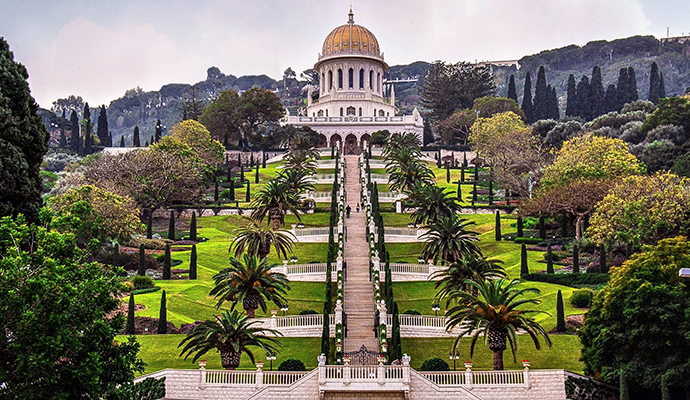
Haifa
Cascading down the slopes of Mount Carmel towards the sandy beaches of the Mediterranean, Israel’s third-largest city is often overlooked as a tourist destination. Yet the city has a lot going for it, and is a great place to spend a few days. Haifa has grown tremendously since its foundation, when Allenby Street used to be called Zeytoon (Olive) Street in honour of the olive trees and farms, which have today given way to a modern residential area.
The vast, landscaped gardens of the Shrine of Bab, the centre of the Baha’i faith, form the unexpected centrepiece of the city, while its thriving port is the largest in the country. Prosperous industries, a large hilltop university, countless religious and historic sights, neighbourhoods old and new, a fascinating collection of museums and a lively restaurant and bar scene make Haifa a firm favourite among Israelis and a pleasant contrast to Jerusalem and Tel Aviv.
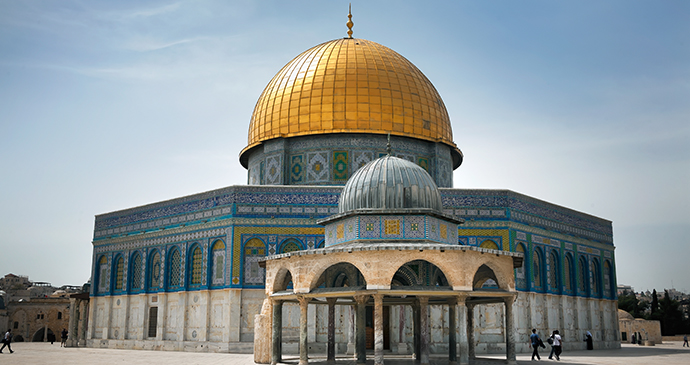
Jerusalem
As the sun sets over Jerusalem’s white-stone buildings, it is impossible to imagine the millions of people who have stood and witnessed the very same event. Its many different inhabitants have given it a cultural and religious make-up like no other place on earth, a place pilgrims flock to and residents defend to the bitter end. To define the city is impossible, as it is above all else a city of contrasts: where Judaism, Christianity and Islam meet; where ancient neighbourhoods tumble into shiny new ones; where both the devout and the secular find their own place; and where modern and traditional somehow flourish together.
At its core sits the Old City, a remarkable and awe-inspiring area. Yet despite its historic, archaeological and religious treasures, its centuries of turmoil and conflict, and its political tensions, Jerusalem is first and foremost a vibrant, living city. Outside its walls, the city is a mesh of modern neighbourhoods, efficient transport networks, bustling souks, world-famous museums and high-class universities. Jewish Orthodox, secular and Arabic neighbourhoods each maintain their own traditions, for the most part respecting each other’s day-to-day lives.
Perched 400m above the Dead Sea, the UNESCO-listed Masada archaeological site is a reminder of the Jewish resistance against Roman rule © Protasov AN, Shutterstock
Masada
Upon the protruding rock that towers some 400m above the western shore of the Dead Sea, IDF soldiers come to swear allegiance, repeating the mantra ‘Masada shall not fall again’. For it was here, on the precipitous rock shelf, that the ancient fortress built by Herod the Great in the 1st century BCE became the 20th-century symbol of Jewish heroism. The fortress was captured by the Zealots, a Jewish sect, in 66CE in their revolt against Rome and became the last standing Jewish stronghold. After a long siege, the Romans finally stormed the fortress in 73CE, only to find that all 960 Zealots had committed suicide rather than surrender to their forces.
Today, it is one of the most important stops on the Jewish pilgrimage route and in 2001 was awarded UNESCO World Heritage status. A museum complex opened in 2007 displays some of the most impressive artefacts excavated from the ruins as well as depicting the life, times and history of this fascinating site.
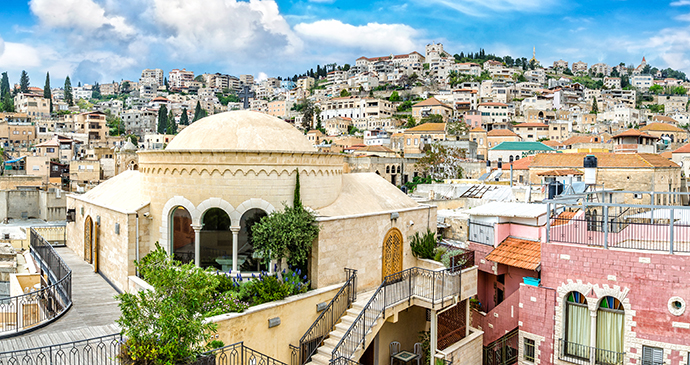
Nazareth
Nazareth – Israel’s largest Arab city – rests atop, between and around five hills that form the end of the Galilee Mountains presiding over the Jezreel Valley below. Religious and historic sites centre on the Old City in the heart of Nazareth, where preconceived images of quaint cobbled stone alleys and bustling markets are fully realised. Outside the Old City, however, Nazareth is a hectic, modern and vibrant Arab city where the aromas of strong coffee, spices and sweets drift along the streets and where the loud chatter and the sounds of car horns dull only marginally at prayer times.
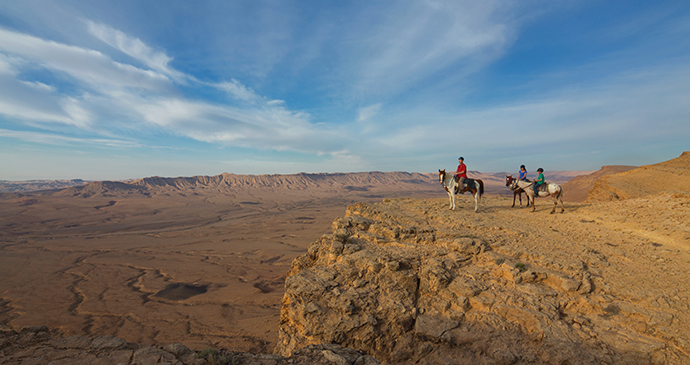
Ramon Crater Nature Reserve
At 45km long, 8km wide and 500m deep, the Ramon Crater is a vast gash across the Negev Desert. Often referred to internationally by its Hebrew name makhtesh, the crater was formed millions of years ago as the ocean that once covered this part of the desert retreated northwards. Around five million years ago, the Arava Rift Valley was created causing great rivers to divert their course, their powerful flows eroding the land and leaving in their wake a great crater. The black rock throughout the crater is obsidian natural glass, formed by the cooling of volcanic lava. The nature reserve boasts a rich habitat, particularly vultures, which are now considered endangered in Israel, hyenas and ibex.
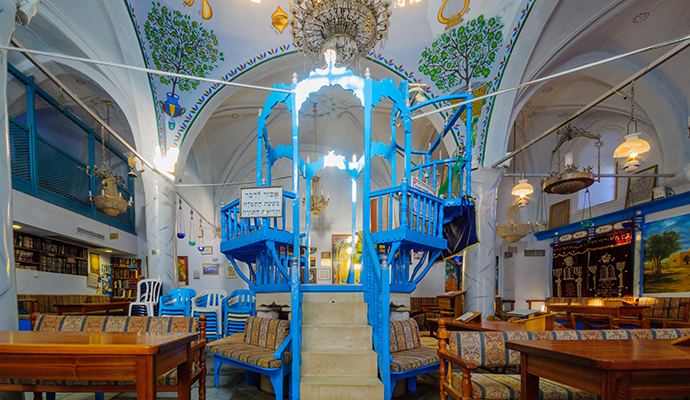
Safed
Perched high on the green, wooded slopes of the Upper Galilee mountains, Safed’s clean, fresh air seems to whisper the secrets of the past, where Jewish mysticism abounds and whose spirit is still so clearly present. Cobbled stone alleyways, small cottages dotted with blue doors and windows and an abundance of ancient synagogues form the Old City, where today artists show off their talents in open studios.
Safed is regarded as one of Judaism’s four Holy Cities (along with Jerusalem, Tiberias and Hebron) and was home to some of the religion’s true greats. Scholars, spiritual leaders and religious philosophers gathered in the 16th century and together they gave Safed its proud status as a world centre for Jewish mysticism, Kabbalah. Today, they rest atop the mountain in the ancient cemetery, whose views befit their status as the ‘righteous ones’. With the swift rise in Kabbalah’s popularity across the world, the quiet little town of Safed has suddenly found itself the centre of a budding spiritual tourism industry. Followers flock to study in the multitudinous centres of learning, where the substantial Hassidic Orthodox presence lends an air of antiquity, as though time has stood still. But somehow Safed’s charm and sacred atmosphere have not been weakened (within the Old City at least), and it is an alluring and enchanting place to explore.
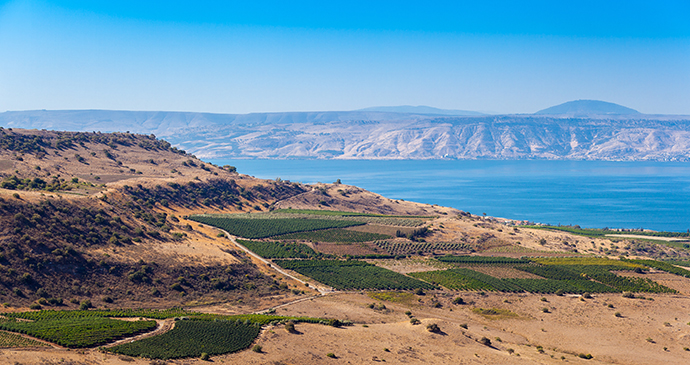
Sea of Galilee
For hundreds of years Christian pilgrims have made their way to the gently lapping shores of the Sea of Galilee (known in Hebrew as ‘the Kinneret’) to soak up the abounding tranquillity, gaze down at ancient lands and walk in Jesus’s footsteps. Today is no different, and despite the scores of tour buses that make regular stops along the sea, it has managed for the most part to avoid a mass-produced, over-touristy feel and there is a tranquil vibe with banana plantations and mango trees lining the pretty coastline. This, however, doesn’t apply to the Sea of Galilee’s beaches which are extremely popular with young Israeli teenagers.
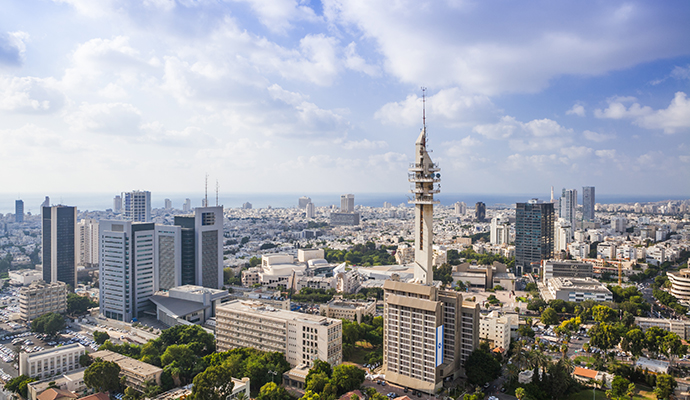
Tel Aviv
Tel Aviv is the black sheep of the family. Where Jerusalem is proud of its biblical history, architectural beauty and devout religiousness, Tel Aviv’s pride is found in the opposites. This colourfully loud and flamboyant city has an almost hedonistic atmosphere, where the main concerns are what to wear, where to be seen and where to party. Tel Aviv, whose name translates as ‘Hill of Sprint’ or ‘Spring Mound’, is the economic, financial and commercial heart of Israel. A recent boom in international business has seen the city flourish, with a big international airport, seafront overlooked by large five-star hotels, a highly profitable diamond exchange and the emergence of modern high-rise buildings standing as testament to this. While few would describe Tel Aviv as beautiful, a closer look will reveal the world’s largest collection of Bauhaus buildings, a pre-Nazi German architectural style, granting it UNESCO World Heritage status in 2004.
In a country steeped in centuries-old history, Tel Aviv has managed to make its mark on the country in just six decades. Today, it epitomises the average Israeli. The fast-paced, hard-working and fun-loving way of life has drawn people from all over the country and abroad to make money and have plenty of fun spending it. While it may be easy for visitors to overlook Tel Aviv, using it as a gateway to the more traditional sights in Jerusalem, the Dead Sea and Galilee, a trip to Israel would most certainly be a biased one without a stop in this, the most Israeli of Israel’s cities.
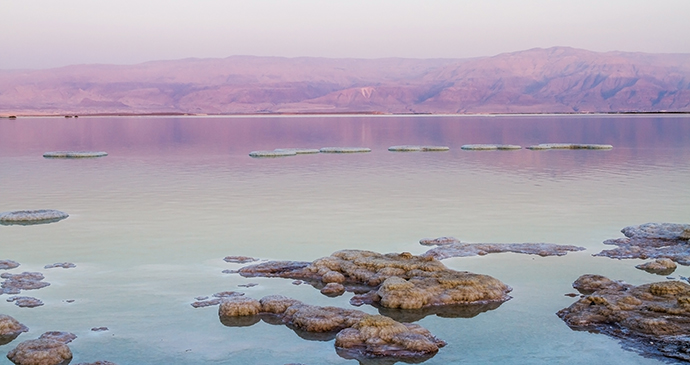
The Dead Sea
The eerie name of the sea that marks the lowest point on earth couldn’t in fact be more apt. Shark-a-phobes be reassured, for in the salty waters of the Dead Sea nothing can live, its extreme salinity meaning all forms of organism are unable to survive, both in the water and on the shores that surround it. Yet in contrast to this rather gloomy picture of a barren and lifeless region, the Dead Sea has had a colourful religious, cultural and geological life.
Biblical history abounds along the shores of the sea, with names such as John the Baptist, King David, King Herod, Sodom, Gomorrah and Lot intricately connected with its history. With the discovery of the Dead Sea Scrolls at Qumran in 1947, the sea’s religious significance became unparalleled. In recent years, the phenomenon that spurred King Herod to build his majestic spa on the cliff at Masada has been tapped and the sale of Dead Sea products for their therapeutic properties has become a worldwide trade, thrusting Israel into the tourist limelight.
The incredible buoyancy of the Dead Sea makes for a fun and slightly surreal experience, bobbing up and down like a cork. Beaches have subsequently popped up along the coast, ranging from free and crowded to expensive and crowded to private and crowded. In peak seasons, finding a place to put your towel is unlikely, but out of season (especially midweek) beaches are much quieter.
You can find more interesting and fun facts about the Dead Sea here.
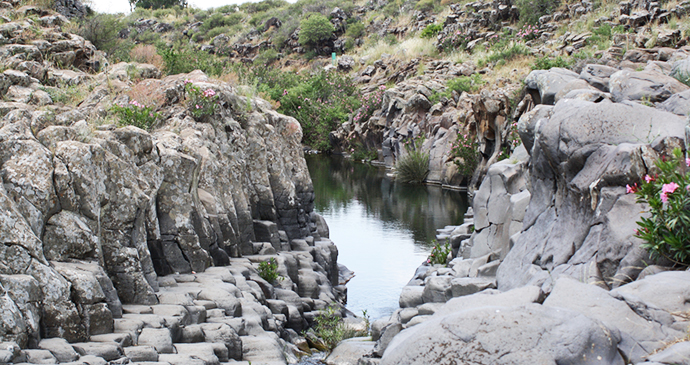
Yehudiya Forest Nature Reserve
The park’s 66km2 are home to wild boar, jackals, red foxes, Syrian hyrax and porcupines who live amid the huge variety of tree and plant species. It is also one of the best spots in the region to spy the Bonelli’s eagle and Egyptian vulture that are often seen soaring in the skies above. Flowing through the ‘fingers’ of the park are the Meshoshim, Zavitan, Yehudiya, Gamla and Daliyot rivers that emerge from deep, rock-cut canyons into the Beit Zaida Valley just north of the Sea of Galilee.
The charming moshav of Zichron Yaakov is Israel’s longest-serving wine producer © Konstantnin, Shutterstock
Zichron Yaakov
Founded in 1882 by Romanian Jews during the first Aliyah, Zichron Yaakov has managed to come a long way without losing its quaint charm and old-worldly atmosphere. In the year following its founding the village came under the patronage of Baron Edmond de Rothschild who named it Zichron Yaakov (Memory of Jacob) after his father. Rothschild had extensive vineyards planted, the country’s first, which today are considered among the top wine producers in the country and recognised internationally. Winemaking soon became the primary economy within the moshav, and in the 1950s new immigrants to Israel flocked in great numbers to Zichron Yaakov to settle.
In recent decades, the town has developed a second crucial economy: tourism. Israelis flock to the beautiful leafy, cobbled lanes strewn with outdoor cafés, restaurants and art galleries; traditional gas lamps adorn the pavements, and red shingle buildings and blossoming almond trees combine with the modern development to produce a truly unique Israeli town.
Related books
For more information, see our guide to Israel:
Related articles
Israel may be small, but it is a veritable treasure trove of wonders.
How many of these have you climbed?
Whether you are a novice or an avid birdwatcher, aviary spectacles can be amongst the greatest in the animal kingdom.
At the crossroads of Judaism, Christianity and Islam, Jerusalem is home to some of the most important religious sites in the world.
